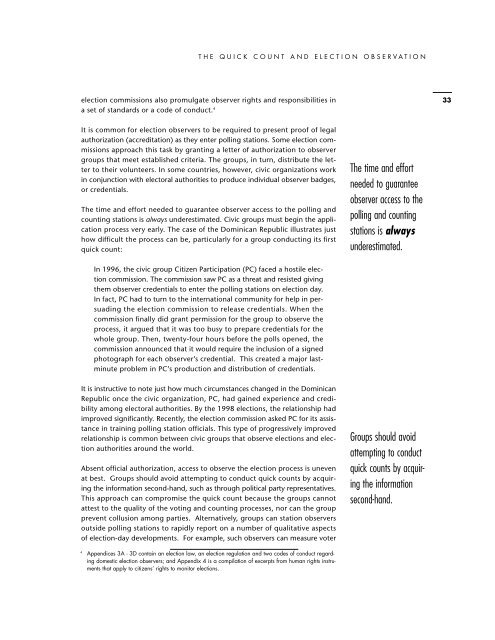The Quick Count and Election Observation
The Quick Count and Election Observation
The Quick Count and Election Observation
Create successful ePaper yourself
Turn your PDF publications into a flip-book with our unique Google optimized e-Paper software.
THE QUICK COUNT AND ELECTION OBSERVATION<br />
election commissions also promulgate observer rights <strong>and</strong> responsibilities in<br />
a set of st<strong>and</strong>ards or a code of conduct. 4<br />
33<br />
It is common for election observers to be required to present proof of legal<br />
authorization (accreditation) as they enter polling stations. Some election commissions<br />
approach this task by granting a letter of authorization to observer<br />
groups that meet established criteria. <strong>The</strong> groups, in turn, distribute the letter<br />
to their volunteers. In some countries, however, civic organizations work<br />
in conjunction with electoral authorities to produce individual observer badges,<br />
or credentials.<br />
<strong>The</strong> time <strong>and</strong> effort needed to guarantee observer access to the polling <strong>and</strong><br />
counting stations is always underestimated. Civic groups must begin the application<br />
process very early. <strong>The</strong> case of the Dominican Republic illustrates just<br />
how difficult the process can be, particularly for a group conducting its first<br />
quick count:<br />
<strong>The</strong> time <strong>and</strong> effort<br />
needed to guarantee<br />
observer access to the<br />
polling <strong>and</strong> counting<br />
stations is always<br />
underestimated.<br />
In 1996, the civic group Citizen Participation (PC) faced a hostile election<br />
commission. <strong>The</strong> commission saw PC as a threat <strong>and</strong> resisted giving<br />
them observer credentials to enter the polling stations on election day.<br />
In fact, PC had to turn to the international community for help in persuading<br />
the election commission to release credentials. When the<br />
commission finally did grant permission for the group to observe the<br />
process, it argued that it was too busy to prepare credentials for the<br />
whole group. <strong>The</strong>n, twenty-four hours before the polls opened, the<br />
commission announced that it would require the inclusion of a signed<br />
photograph for each observer’s credential. This created a major lastminute<br />
problem in PC’s production <strong>and</strong> distribution of credentials.<br />
It is instructive to note just how much circumstances changed in the Dominican<br />
Republic once the civic organization, PC, had gained experience <strong>and</strong> credibility<br />
among electoral authorities. By the 1998 elections, the relationship had<br />
improved significantly. Recently, the election commission asked PC for its assistance<br />
in training polling station officials. This type of progressively improved<br />
relationship is common between civic groups that observe elections <strong>and</strong> election<br />
authorities around the world.<br />
Absent official authorization, access to observe the election process is uneven<br />
at best. Groups should avoid attempting to conduct quick counts by acquiring<br />
the information second-h<strong>and</strong>, such as through political party representatives.<br />
This approach can compromise the quick count because the groups cannot<br />
attest to the quality of the voting <strong>and</strong> counting processes, nor can the group<br />
prevent collusion among parties. Alternatively, groups can station observers<br />
outside polling stations to rapidly report on a number of qualitative aspects<br />
of election-day developments. For example, such observers can measure voter<br />
Groups should avoid<br />
attempting to conduct<br />
quick counts by acquiring<br />
the information<br />
second-h<strong>and</strong>.<br />
4<br />
Appendices 3A - 3D contain an election law, an election regulation <strong>and</strong> two codes of conduct regarding<br />
domestic election observers; <strong>and</strong> Appendix 4 is a compilation of excerpts from human rights instruments<br />
that apply to citizens’ rights to monitor elections.


